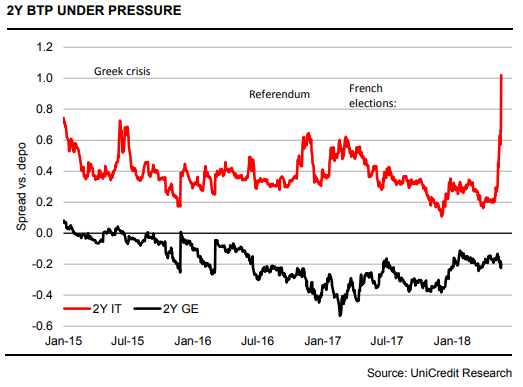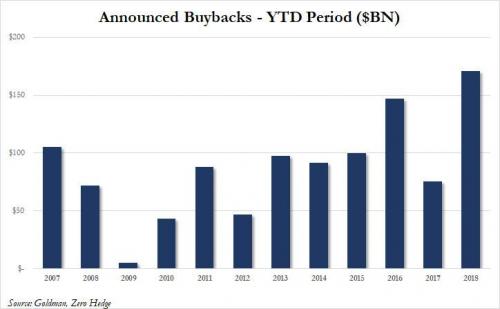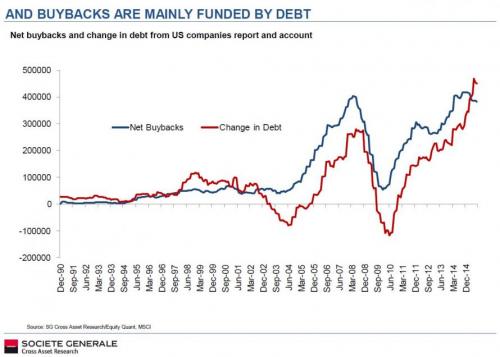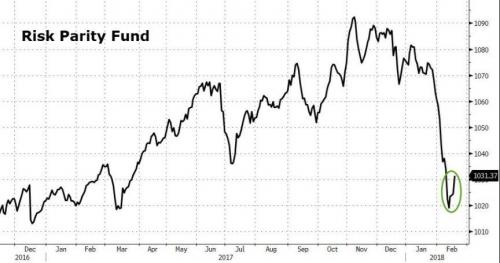
Edvard Munch Separation 1896

Draghi must save Italy. Even if he doesn’t like its government.
• The ECB Is Preventing An Italian Rerun Of The Euro Crisis – For Now (MW)
As a result of the ECB’s purchases, only 32% of Italian government bonds are still held by foreign investors, Solveen noted, and only a third of those are held outside the eurozone. That compares with more than 40% before the sovereign debt crisis. [..] The ECB’s deposit rate stands at negative 0.4%, while its key lending rate stands at 0%. Rates wont’ rise soon, Solveen notes, and that’s curbing the rise of short-term bond yields. It also means Italy will be able to issue new bonds with low coupons, at least in the two-to-three-year maturity range, he said, which should also anchor long-end yields.
And since the average duration of Italian bonds has risen significantly in recent years, Italy’s Treasury can shift its issuance back toward shorter-dater maturities if needed. But it’s weakness at the short end of the yield curve—the line plotting yields across all debt maturities—that might be most troubling for investors right now. “Strong selling pressure at the short end is noteworthy…, while there have been a few other such episodes since the start of QE, this is the strongest one,” said Luca Cazzulani, deputy head of fixed income at UniCredit, in Milan (see chart below).

An important near-term test looms Monday when the Treasury is due to sell 2-year zero-coupon notes and inflation-indexed BTPs. The auction round “will be closely watched and results are likely to drive BTPs more than usual,” Cazzulani said, in a note. “Considering the still fragile market environment, pressure ahead of the auction should not come as a surprise.” Both auctions are smaller than usual, which should help keep supply pressures low, he said. Solveen said that while the new government’s policies are unlikely to trigger a new sovereign debt crisis, the situation underlines the fundamental differences in economic policy thinking within the eurozone.
“The ECB’s very expansionary monetary policy and the resulting cyclical economic recovery can conceal this fact to some extent but, at the next recession at the latest, the difference could become very apparent again and prove a real test for the monetary union,” he said.

Power games. The establishment protests.
• Italy President Under Pressure To Accept Eurosceptic Minister (R.)
Italy’s would-be coalition parties turned up the pressure on President Sergio Mattarella on Saturday to endorse their eurosceptic pick as economy minister, saying the only other option may be a new election. Mattarella has held up formation of a government, which would end more than 80 days of political deadlock, over concern about the far-right League and anti-establishment 5-Star Movement’s desire to make the 81-year-old economist Paolo Savona economy minister. Savona has been a vocal critic of the euro and the European Union, but he has distinguished credentials, including in a former role as an industry minister. Formally, Prime Minister-designate Giuseppe Conte presents his cabinet to the president, who must endorse it.
Conte, a little-known law professor with no political experiences, met the president on Friday without resolving the deadlock. “I hope no one has already decided ‘no’,” League leader Matteo Salvini shouted to supporters in northern Italy. “Either the government gets off the ground and starts working in the coming hours, or we might as well go back to elections,” Salvini said. Later 5-Star leader Luigi Di Maio said he expected there to be a decision on whether the president would back the government within 24 hours. 5-Star also defended Savona’s nomination. “It is a political choice … Blocking a ministerial choice is beyond (the president’s) role,” Alessandro Di Battista, a top 5-Star politician, said.

“Everybody’s practically euphoric and Trump is a good cheerleader. But, there is a lot of weakness behind the numbers..”
• We’re Engaging In Self-Deception And Unsupported Hopefulness (Ron Paul)
When you think about it, I was born in 1935, in the middle of the Depression. I remember my early life. I remember when I was 3 years old and 5 years old and the Depression lasted through World War II and the conditions were such as I remember very clearly, but it wasn’t a big deal for me even though we lived in close quarters and we didn’t have a lot of shoes and were just skimping by. So, we went through a Depression and World War II. Those were pretty tough times and since that time — since the war issue’s always been a big issue with me — I remember the tragedies of World War II. We had relatives in Germany, so it always caught my attention. Then we had the Korean War. I could remember my mother saying, “another war this soon?”
We just got over one, so she was negative on that and then we had the Vietnam War and I knew that I probably would be drafted and that was one of the reasons that helped me move toward medicine. So, those were pretty bad times. Think of the people that were dying over those first 30 or 40 years. Things weren’t great economically either. In America, we were not even allowed to own gold. Those were conditions that existed that changed for the better to some degree. Philosophically, I think, we’re still on the wrong track overall, although some things have improved. Once again, we’re able to own gold. The United States government and I pushed it along when I was in Congress to mint gold coins again and talk about monetary policy.
Philosophically, we are making progress in some areas, though, and I give a lot of credit to the institutions that do this, like the Mises Institute and FEE. And of course, I want to participate in changing foreign policy and we keep working on that through the Ron Paul Institute. But, on the downside of all this, I see we’re on a disastrous course even though the official economic indicators look great and wonderful. Everybody’s practically euphoric and Trump is a good cheerleader. But, there is a lot of weakness behind the numbers, and we’re engaging in self-deception and unsupported hopefulness that things will be all good, there will be no inflation or high unemployment, and there’ll be no major war. I think when I look at the seeds that have been sown, the future looks rather bleak in many ways, even compared to what it was like as we finished World War II and Vietnam.

“Breaking the rules is becoming the new rule..”
• Putin Warns “US Sanctions Hurt Trust In Dollar As Reserve Currency” (ZH)
Despite his absence from Vladimir Putin’s annual economic showcase – which included such US allied luminaries as Japanese Prime Minister Shinzo Abe, French President Emmanuel Macron, China’s Vice President Wang Qishan and IMF chief Christine Lagarde – the conversation kept coming back to President Trump. Led by an unusually outspoken Putin, Macron – who seemed more enamored with Putin than the rest, agreed with the Russian president’s concerns over the erosion of trust and the specter of a global crisis brought on by Washington’s disruptions. “The free market and fair competition are being squeezed by confiscations, restrictions, sanctions,” Putin said. “There are various terms but the meaning is the same – they’ve become an official part of the trade policy of certain countries.”
The “spiral” of U.S. penalties is targeting “an ever larger number of countries and companies,” undermining “the current world order,” he said. Macron replied: “I fully share your point of view.” Such warnings only confirm Mr Putin’s world view. Without mentioning the US, he complained that the multilateral economic world order was being “crushed” by a proliferation of exceptions, restrictions and sanctions. The “darkest cloud” on the economic horizon is the “determination of some to actually rock the system,” Lagarde said, prompting Wang, a new point-man for Chinese foreign policy, to agree. “Politicizing economic and trade issues, and brandishing economic sanctions, are bound to damage the trust of others,” he said.
[..] The global economy is facing a threat of a spiraling protectionist measures that can lead to a devastating crisis, Vladimir Putin warned. Nations must find a way to prevent this and establish rules on how the economy should work. The Russian president spoke out against the growing trend of using unilateral restrictions to achieve economic advantage, as he addressed guests of the St. Petersburg International Economic Forum (SPIEF) on Friday. “The system of multilateral cooperation, which took years to build, is no longer allowed to evolve. It is being broken in a very crude way. Breaking the rules is becoming the new rule,” he said. Putin sharply criticized the sanctions, saying they signal “not just erosion but the dismantling of a system of multilateral cooperation that took decades to build.”

Which will cause them to do the exact opposite.
• Erdogan Calls On Turks To Convert Dollar, Euros Into Lira (R.)
Turkish President Tayyip Erdogan called on Turks on Saturday to convert their dollar and euro savings into lira, as he sought to bolster the ailing currency which has lost some 20 percent of its value against the U.S. currency this year. “My brothers who have dollars or euros under their pillow. Go and convert your money into lira. We will thwart this game together,” Erdogan said at a rally in the eastern city of Erzurum ahead of parliamentary and presidential elections on June 24.

One moment they claim to have gotten it done, the next they start all over again..
• Spain’s Ciudadanos Party Open To Alternative Candidate To Oust PM Rajoy (R.)
Spain’s center-right Ciudadanos party said on Saturday it would be willing to back an unspecified neutral candidate to oust Prime Minister Mariano Rajoy over a far-reaching graft case engulfing members of his People’s Party (PP). Jose Manuel Villegas, secretary-general of Ciudadanos, told a news conference his party could work with the opposition Socialists to support an alternative candidate in a no-confidence vote to unseat its former ally Rajoy, who leads a minority government beset by numerous corruption scandals. Rajoy said on Friday he would fight the no-confidence vote and finish his four-year term, ruling out early elections.
Pro-business Ciudadanos (meaning Citizens in English) declined to support the no-confidence motion put forward by Socialist leader Pedro Sanchez earlier that day. But Villegas said on Saturday his party could back a “practical candidate” who was neither Sanchez nor Ciudadanos leader Albert Rivera. To succeed, the two parties would need to agree a joint candidate to replace Rajoy and on other questions such as calling a snap election. They would also need the backing of leftist party Podemos. A no-confidence vote requires the candidate to gather 176 or more votes in Spain’s lower house, a difficult task in the fragmented parliament where nationalists, among them two Catalan separatist parties, could be decisive if the larger parties cannot reach an agreement.
Speaking to Cope radio on Saturday, Socialist Secretary General Jose Luis Abalos said the party would not work with Catalan separatist parties and called on Ciudadanos to support Sanchez’s bid to replace Rajoy as PM in exchange for a promise to call snap elections soon after taking office. [..] The graft case, which relates to the use of a slush fund by the PP in the 1990s and early 2000s to illegally finance campaigns, has plagued Rajoy since he took office in 2011. He has always denied wrongdoing. 29 people related to the PP, including a former treasurer and other senior members, were convicted on Thursday of offences including falsifying accounts, influence-peddling and tax crimes. They were sentenced to a combined 351 years behind bars.

They just keep at it. Jail time is required.
• Daimler Threatened With Recall Of Over 600,000 Diesel Models (R.)
Daimler faces a recall order for more than 600,000 diesel-engine vehicles including C-Class and G-Class models because of suspected emissions manipulation, German magazine Der Spiegel reported on Friday. Germany’s KBA vehicle authority is probing concrete suspicions that the affected cars were fitted with illicit defeat devices designed to manipulate emissions levels, the magazine said, without citing sources. Daimler said on Friday it had not received a formal summons from KBA regarding its C-Class and G-Class models, a precursor to a recall, but declined to comment in detail on the Spiegel report.
The report comes a day after the KBA ordered Daimler to recall the Mercedes Vito van model fitted with 1.6 liter diesel Euro-6 engines because of engine control features to reduce exhaust emissions which KBA said breached regulations. Daimler has said it is appealing the KBA findings on the Vito and will go to court if necessary. Since rival Volkswagen admitted in 2015 to cheating U.S. emissions tests, German carmakers including VW, Daimler and BMW have faced a backlash against diesel technology in which they have invested billions of euros.

And that calls for a royal visit…
• British Arms Exports To Israel Reach Record Level (G.)
British defence contractors are selling record amounts of arms to Israel, new figures reveal, just days after it was confirmed that Prince William will represent the UK government on a visit to the country next month. Figures from the Campaign Against Arms Trade reveal that last year the UK issued £221m worth of arms licences to defence companies exporting to Israel. This made Israel the UK’s eighth largest market for UK arms companies, a huge increase on the previous year’s figure of £86m, itself a substantial rise on the £20m worth of arms licensed in 2015. In total, over the past five years, Israel has bought more than £350m worth of UK military hardware.
Licences issued to UK defence contractors exporting to Israel last year include those for targeting equipment, small arms ammunition, missiles, weapon sights and sniper rifles. In 2016 the UK issued licences for anti-armour ammunition, gun mountings, components for air-to-air missiles, targeting equipment, components for assault rifles, components for grenade-launchers and anti-riot shields. Human rights groups have questioned the wisdom of sending a senior royal to a country whose use of lethal force last month has been the subject of concern from the UK government.
“After the appallingly excessive response of the Israeli security forces at the Gaza border, tensions in the occupied Palestinian territories are likely to be close to boiling point when Prince William makes this historic visit,” said Kerry Moscogiuri, Amnesty International UK’s campaigns director.

Kim makes a call, and they meet less than 24 hours after. That is a big change all by itself.
• Koreas Discuss Non-Aggression Pledge, Peace Treaty Ahead Of Summit (R.)
North and South Korea are discussing a possible non-aggression pledge by the United States to the North and a start of peace treaty talks to address Pyongyang’s security concerns before a North Korea-U.S. summit, a senior South Korean official said on Sunday. South Korean President Moon Jae-in and North Korean leader Kim Jong Un held a surprise second meeting on Saturday after U.S. President Donald Trump called off his talks, set for June 12 in Singapore, before floating a reinstatement of the plan.
“For the success of the North Korea-U.S. summit, we’re exploring various ways of clearing North Korea’s security concerns at the working level,” the senior South Korean presidential official told reporters. “That includes an end to hostile relations, mutual non-aggression pledge, a launch of peace treaty talks to replace the current armistice,” the official said. The two Koreas are also in talks over a three-way declaration of the end to 1950-53 Korean War but there has not been any agreement yet over a tripartite summit, the official said.

Everyone’s deleting emails. The FBI is all over this. Assange was framed. If prosecutors are not independent, this is what you get. And she’s a lousy liar to boot.
• How Did The Swedish Matter End? (Justice4Assange)
The extradition warrant from Sweden was revoked on 19 May 2017, when the prosecutor also closed the entire underlying investigation. Having obtained Mr. Assange’s testimony, the prosecutor decided it would be disproportionate to proceed. The investigation had already been found to be baseless by Stockholm’s senior prosecutor, Eva Finne, who found that the conduct alleged by the police “disclosed no crime at all”. SMS messages from the alleged complainant made public in 2015 showed that she “did not want to accuse Assange of anything”, that she felt “railroaded by police and others around her”, and “police made up the charges”.
The UK’s role in the Swedish affair was exposed in emails obtained under Freedom of Information Act which revealed that Sweden moved to drop the investigation in 2013, but the UK Crown Prosecution Service persuaded Sweden to keep it alive. Emails show the UK advised Sweden not to interview Mr. Assange in the UK in 2011 and 2012. UK prosecutors admitted to deleting key emails concerning Assange and engaged in elaborate attempts to keep correspondence from the public record. The Swedish prosecutor admitted to deleting an email from an FBI agent about Assange which she received in 2017, and claimed it could no longer be recovered (Video in English and Swedish):












